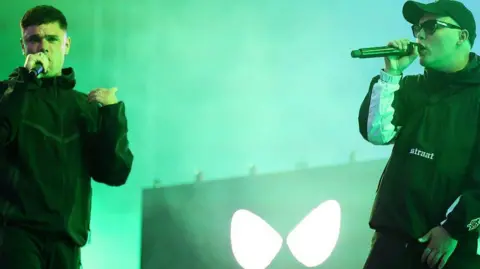Kneecap, the Irish-language hip-hop trio, made headlines recently during their first significant performance since one of their members, Liam Óg Ó hAnnaidh, was charged with an alleged terror offense. The festival, held at Wide Awake in Brixton, London, saw a solid turnout of dedicated fans supporting the band amid rising tensions surrounding their recent controversies. This performance came in the wake of Ó hAnnaidh’s legal troubles following his alleged display of a Hezbollah flag at a concert last year, leading the band to label the charges as “political policing” aimed at silencing their voices as they navigate the politically charged landscape around the ongoing conflict in Gaza.
During the performance, which marked Kneecap’s biggest festival headline gig to date, Ó hAnnaidh addressed the audience, asserting that the authorities were attempting to restrain their public presence before significant events like Glastonbury. He rallied the crowd to chant “free free Palestine,” aligning their music with current socio-political movements. Echoes of solidarity filled the park as attendees voiced support for Palestine, generating a palpable atmosphere during their performance, wherein they mixed upbeat tracks and heartfelt messaging.
The backdrop of the concert was not merely about music; it was intertwined with deep political sentiments stemming from the ongoing Gaza conflict, which has seen catastrophic humanitarian implications since the escalation of violence began on October 7, 2023. Kneecap’s frontman, known as Mo Chara, emphasized the privilege of being in a festival setting, free from bombings, thus prompting attendees to reflect on the situation in Gaza, where a staggering death toll has been reported, including thousands of civilians, chiefly children. The UN had also commented on the deteriorating humanitarian conditions, further underscoring the urgency of global recognition and action.
Additionally, the group’s decision to interweave political discourse within their performances has attracted considerable attention, often sparking discussions about freedom of speech and artistic expression. Despite facing significant backlash and accusations of supporting terrorism, they continue to advocate for free expression while also apologizing to the families of politicians impacted by their previous statements. They contend that their comments have been taken out of context and manipulated by authorities.
Friday’s concert was part of a wider narrative for Kneecap, as they have begun to garner a reputation as provocative figures in the music scene, channeling their experiences and perspectives on issues of identity, conflict, and societal inequalities through their music. Their compelling blend of Irish and English lyrics has resonated with many, allowing them to cultivate a diverse fanbase eager to engage with their themes.
In the wake of their charged performance, multiple events have unfolded, reflecting the polarizing opinions surrounding Kneecap. Some politicians and community leaders have called for the band to be banned from future performances, citing concerns over public safety and national sentiment. Others from the artistic community have defended the group, emphasizing the importance of creative expression amidst politically driven backlash.
Furthermore, Kneecap’s artistic endeavors have had a tangible impact on their increasing popularity, with their album “Fine Art” experiencing heightened streaming activity amid the controversy. New tracks such as “The Recap” further illustrate their commitment to addressing socio-political themes contemporaneously.
Fans at the Brixton event displayed a mix of prizes, proudly waving Irish and Palestinian flags while expressing solidarity with the band’s messages. Through the energy of the crowd and the eclectic performance, Kneecap has not only established themselves as a sound representative of contemporary issues but also created a platform for discourse surrounding freedom of speech and artistic expression in the face of adversity.
Overall, Kneecap’s position continues to be both celebrated and scrutinized, as their artistic journey momentarily intertwines with pressing global dilemmas, capturing the attention of the music world and the political landscape alike. Their argument centers on expressing solidarity and voice against oppression, consciously provoking dialogue while inviting their audience to participate in the conversation. As they prepare for future performances, including the highly anticipated Glastonbury festival, questions about the intersection of music, politics, and society will continue to unravel in profound ways.



